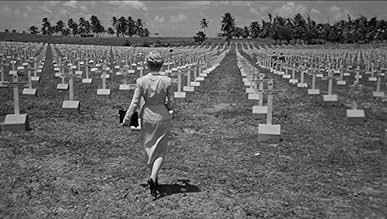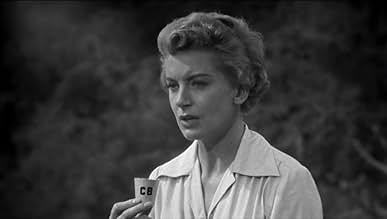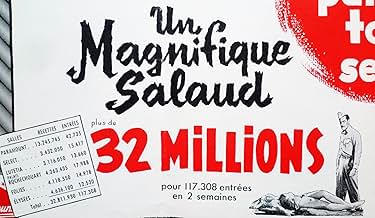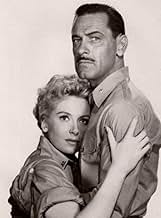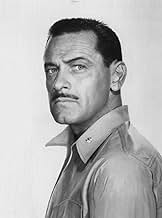IMDb-BEWERTUNG
6,2/10
801
IHRE BEWERTUNG
Füge eine Handlung in deiner Sprache hinzuIn the Pacific during WWII, a Roman Catholic widow falls for a tough lieutenant colonel.In the Pacific during WWII, a Roman Catholic widow falls for a tough lieutenant colonel.In the Pacific during WWII, a Roman Catholic widow falls for a tough lieutenant colonel.
- Regie
- Drehbuch
- Hauptbesetzung
- Für 2 Oscars nominiert
- 2 Nominierungen insgesamt
Claude Akins
- Big Soldier
- (Nicht genannt)
Nina Borget
- French Woman
- (Nicht genannt)
George Brenlin
- Casualty
- (Nicht genannt)
Lorayne Brox
- Sissie
- (Nicht genannt)
Evelyn Cotton
- Beth
- (Nicht genannt)
Maynard Ferguson
- Trumpet Player in Dance Scene
- (Nicht genannt)
Empfohlene Bewertungen
Considering the cast this oddly obscure WWII war drama is nothing special but is ultimately an entertaining drama.
The basic story is a standard one of a clash of values between two people with very different life experiences.
The best performance as usual comes from Thelma Ritter as a no nonsense nurse, whenever she's on screen she cuts right through the somewhat sugary dramatics with astringent fortitude.
Deborah Kerr and William Holden perform their assigned roles well but their characters are both pretty selfish and unsympathetic to involve you in their story.
The basic story is a standard one of a clash of values between two people with very different life experiences.
The best performance as usual comes from Thelma Ritter as a no nonsense nurse, whenever she's on screen she cuts right through the somewhat sugary dramatics with astringent fortitude.
Deborah Kerr and William Holden perform their assigned roles well but their characters are both pretty selfish and unsympathetic to involve you in their story.
This film does capture the negativity of war! It's wonderful to see William Holden play a part where he may not be the most lovable man in the world. It's just as rewarding to see Deborah Kerr as a woman of great beauty and sexuality! I think the acting of all the cast is wonderful! The acting of the chaplain maybe a little over the top( just my opinion.) I wasn't going to watch this film all the way through, however; once I got into it I got hooked!! It is a sad film! But I can't say that any movie about war is to make a person happy!! It is about loss, but there is also some redeeming qualities in the characters. Especially at the end!!!
Deborah Kerr is a war widow during the Second World War. Her husband joined the Marines, despite being an architect and thus made for the Engineers, became a paratrooper, and died on Guadalcanal. So she has joined the American Red Cross and is working under Thelma Ritter. Tough-as-nails William Holden sees her, decides he wants her, and they begin an affair preparatory to getting married. It doesn't work out well.
Somehow we are to think that these two manipulative characters matters a hill of beans, when the supporting characters have so little trouble stealing our attention whenever they're onscreen. Thelma Ritter, of course, but also Dewey Martin as a Marine whom Miss Ritter saved from prison by running a settlement house in his terrible neighborhood; Adam Williams, as the man who tells Miss Kerr off; even Michele Montau as a man-hungry widow.
George Seaton had been an auteur since before they coined the term, and this was the 1950s, so there's certainly some bloating here, with almost two hour elapsing from start to finish. He certainly offers the audience enough big shots, with Puerto Rico standing in for New Caledonia. Holden and Miss Kerr play their roles to the hilt, but I kept waiting for Frank Gorshin or Ross Bagdasarian to show up again.
Somehow we are to think that these two manipulative characters matters a hill of beans, when the supporting characters have so little trouble stealing our attention whenever they're onscreen. Thelma Ritter, of course, but also Dewey Martin as a Marine whom Miss Ritter saved from prison by running a settlement house in his terrible neighborhood; Adam Williams, as the man who tells Miss Kerr off; even Michele Montau as a man-hungry widow.
George Seaton had been an auteur since before they coined the term, and this was the 1950s, so there's certainly some bloating here, with almost two hour elapsing from start to finish. He certainly offers the audience enough big shots, with Puerto Rico standing in for New Caledonia. Holden and Miss Kerr play their roles to the hilt, but I kept waiting for Frank Gorshin or Ross Bagdasarian to show up again.
During WWII, a Red Cross volunteer comes to the South Pacific seeking information about the death of her soldier husband. Kerr is fine as the lonely woman struggling to cope with her loss. This is a strange role for Holden, who usually played characters with integrity. Although the actor is always worth watching, here his character is basically a dishonest heel. It's hard to believe that someone like Kerr, no matter how vulnerable, falls in love with him. Not surprisingly, Ritter steals the film as a tough but caring nurse. The screenplay and direction by Seaton, who worked with Holden on four films, is nothing special, but it's not bad either. The scenery is nice.
The Proud and Profane (1956)
Yes, this movie features William Holden and Deborah Kerr, who do their characteristic best in a lower budget echo of the 1953 blockbuster "From Here to Eternity," also featuring Kerr (but with Lancaster and, for good measure, Montgomery Clift). The comparison is fair, because the similarities are too blatant, and so it's fair to also say that, as ordinary as this movie is, it had potential. There are qualities to the story line that are too moving (wounded soldiers in the Pacific, a widow tracing the last days of her Marine husband's life, a love affair against the rules) and the actors are too fine (add Thelma Ritter as an important third) to just dismiss the whole thing as a mess.
The director, George Seaton, is really a screenwriter, and though he directed a dozen features, none of them are especially memorable. His real fame rests on assisting with several great movies (like "The Wizard of Oz") and with a single brilliant coup--the screenplay for the original 1947 as well as the later TV version of "Miracle on 34th St." And it is no surprise that Seaton's own screen writing in "The Proud and Profane," though prosaic, is very good.
Ah, but filmmaking is about timing, flow, surprise, drama, light, shadow, and sounds of all kinds. This is the director's blank canvas and Seaton doesn't go anywhere in any of these areas. The light is bright and flat. The camera-work is functional and bland (cameraman John Warren being a newcomer, moving quickly to television, including many Hitchcock episodes). The score is strong (thanks to veteran master Victor Young) but there is no attempt to insert diegetic music or more interesting internal sounds. Even the supporting cast is pigeonholed into clichés (and there is no critical secondary male role, as Clift played in the 1953 movie). Thelma Ritter is at her best, more normalized than in other roles, but believable and superb.
I write all this for a routine movie because of Holden, who is an understated and sometimes brilliant actor, and Kerr, who I never warm up to but who is almost designed to be too cold to like. Kerr in particular is up and down here, at times so perfectly cast and so convincing you start to really watch closely, but other times she has to stretch her role a little (when she is dancing, for example, or in the cheesy beach scene early on) and it's awkward. Holden is made to be an enigma, and when he warms up (out of uniform) he's likable, and when he's cold, he's cold, but never admirable, which is what a commander needs to be at least.
I enjoyed this movie because I enjoy movies, but also because it has aspects that are terrific. If you really like war films that aren't about battle (as I do), this is a must see. And if you want perspective on "From Here to Eternity" you really will appreciate both films more. For just a fresh, well-made movie, terrific you will need to keep looking.
Yes, this movie features William Holden and Deborah Kerr, who do their characteristic best in a lower budget echo of the 1953 blockbuster "From Here to Eternity," also featuring Kerr (but with Lancaster and, for good measure, Montgomery Clift). The comparison is fair, because the similarities are too blatant, and so it's fair to also say that, as ordinary as this movie is, it had potential. There are qualities to the story line that are too moving (wounded soldiers in the Pacific, a widow tracing the last days of her Marine husband's life, a love affair against the rules) and the actors are too fine (add Thelma Ritter as an important third) to just dismiss the whole thing as a mess.
The director, George Seaton, is really a screenwriter, and though he directed a dozen features, none of them are especially memorable. His real fame rests on assisting with several great movies (like "The Wizard of Oz") and with a single brilliant coup--the screenplay for the original 1947 as well as the later TV version of "Miracle on 34th St." And it is no surprise that Seaton's own screen writing in "The Proud and Profane," though prosaic, is very good.
Ah, but filmmaking is about timing, flow, surprise, drama, light, shadow, and sounds of all kinds. This is the director's blank canvas and Seaton doesn't go anywhere in any of these areas. The light is bright and flat. The camera-work is functional and bland (cameraman John Warren being a newcomer, moving quickly to television, including many Hitchcock episodes). The score is strong (thanks to veteran master Victor Young) but there is no attempt to insert diegetic music or more interesting internal sounds. Even the supporting cast is pigeonholed into clichés (and there is no critical secondary male role, as Clift played in the 1953 movie). Thelma Ritter is at her best, more normalized than in other roles, but believable and superb.
I write all this for a routine movie because of Holden, who is an understated and sometimes brilliant actor, and Kerr, who I never warm up to but who is almost designed to be too cold to like. Kerr in particular is up and down here, at times so perfectly cast and so convincing you start to really watch closely, but other times she has to stretch her role a little (when she is dancing, for example, or in the cheesy beach scene early on) and it's awkward. Holden is made to be an enigma, and when he warms up (out of uniform) he's likable, and when he's cold, he's cold, but never admirable, which is what a commander needs to be at least.
I enjoyed this movie because I enjoy movies, but also because it has aspects that are terrific. If you really like war films that aren't about battle (as I do), this is a must see. And if you want perspective on "From Here to Eternity" you really will appreciate both films more. For just a fresh, well-made movie, terrific you will need to keep looking.
Wusstest du schon
- WissenswertesFeature-film debut of Frank Gorshin playing the uncredited role of "Harry." In the film's opening at dockside, just after Lee arrives, Kate stops to talk to Harry about obtaining a can of paint off his truck.
- PatzerThe US Army Air Force C-47 cargo planes are painted in post WWII paint scheme rather than the wartime green. When the Air Force became a separate service in 1947 the white over bare metal paint scheme as seen in the movie was adopted.
- Zitate
Chaplain Lt. (jg) Holmes: It must be wonderful to feel that one has lived such a perfect life... that forgiveness has never been necessary.
Top-Auswahl
Melde dich zum Bewerten an und greife auf die Watchlist für personalisierte Empfehlungen zu.
- How long is The Proud and Profane?Powered by Alexa
Details
Box Office
- Bruttoertrag in den USA und Kanada
- 3.900.000 $
- Laufzeit
- 1 Std. 51 Min.(111 min)
- Farbe
- Seitenverhältnis
- 1.85 : 1
Zu dieser Seite beitragen
Bearbeitung vorschlagen oder fehlenden Inhalt hinzufügen


